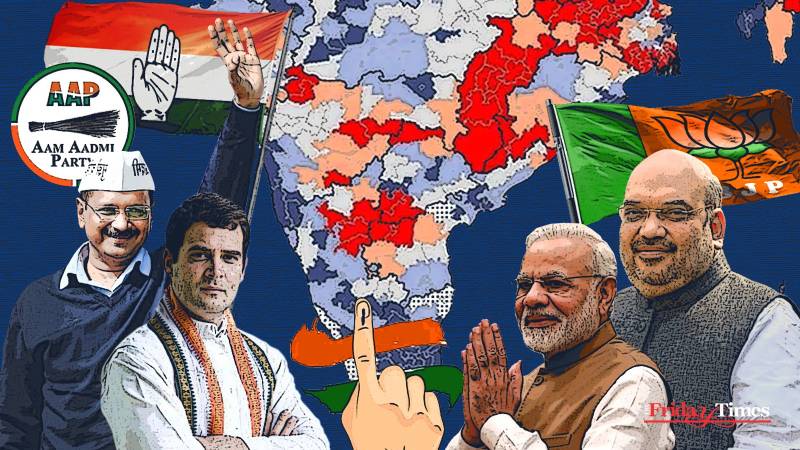
The 2024 Indian general election witnessed a staggering 642 million citizens casting their ballots, a testament to the country's thriving democratic process. The election, praised for its integrity and fairness, underscored the vibrancy of India's democracy.
Perhaps the most important takeaway from the entire exercise is that Prime Minister Narendra Modi's re-election has made him only the second Indian leader since independence to secure a third term, following Jawaharlal Nehru. While the ruling Bharatiya Janata Party (BJP) maintained its national vote share, the unexpected resurgence of the opposition INDIA alliance, particularly Congress leader Rahul Gandhi, suggests a potential shift in India's political dynamics.
Modi's emphasis on development and nationalist policies resonated with Indian voters, propelling his Bharatiya Janata Party (BJP) to multiple election victories. Yet the BJP's inability to win a decisive majority in the latest polls signals mounting obstacles to the party's political hegemony. Undeterred by predictions of their demise, the opposition parties challenged the ruling BJP vigorously, demonstrating their resilience and strategic sense.
Persistent problems like diminishing livelihoods, high unemployment, rising prices, and rising economic inequality have long dominated India's political discourse. Widespread but under-reported public discontent over these pressing challenges seems to have contributed significantly to the BJP's electoral underperformance. The government's "Shining India" rhetoric failed to obscure the urgent issues confronting average citizens.
This election could usher in a more competitive political landscape in India. It is also hoped that the surge in communal polarization, hate speech, and violence targeting Muslims, Dalits, and other vulnerable groups will slow after the election.
The BJP's divisive rhetoric on social issues like religion and caste may have alienated key voter segments, contributing to their electoral setback. While the party has a history of stirring nationalist sentiments to gain support, many voters are more concerned with the practical challenges of daily life.
The BJP's defeat in Uttar Pradesh after 15 years of dominance suggests that voters are becoming more discerning, no longer swayed solely by Modi's charisma. This result shows that united opposition parties can pose a formidable challenge to the ruling party. It also confirms that voters prioritize development, jobs, and social welfare over identity politics.
The BJP sought to bolster its parliamentary majority by courting voters in India's prosperous and well-educated southern states. Modi attempted to connect with southern constituents through cultural overtures and personal outreach. Yet, the BJP did not win any seats in Tamil Nadu and captured just one constituency in Kerala. Analysts suggest the party's Hindu nationalist platform may have alienated southern voters who traditionally favor regional parties promoting social justice causes.
The BJP also faced surprising defeats in Uttar Pradesh and Maharashtra, and its influence did not increase in southern states. Despite gaining 32 additional seats, the party lost 92 incumbent seats in several key states. As a result, the BJP won only 240 out of 543 seats, falling short of a majority government and requiring coalition partners for governance.
The BJP now faces the unfamiliar challenge of governing through coalition partners, which could complicate efforts to advance its reform agenda. With a weakened electoral mandate, the party may struggle to pass politically sensitive legislation, such as a uniform civil code and new criminal laws.
This unexpected electoral setback may compel the BJP to reconsider its governance and electoral strategies. By revealing that the mature Indian voter has a multifaceted identity, the election exposed the limitations of the BJP's politics focused on identity. Consequently, this could usher in a more competitive political landscape in India. It is also hoped that the surge in communal polarization, hate speech, and violence targeting Muslims, Dalits, and other vulnerable groups will slow after the election.
The BJP now faces the unfamiliar challenge of governing through coalition partners, which could complicate efforts to advance its reform agenda. With a weakened electoral mandate, the party may struggle to pass politically sensitive legislation, such as a uniform civil code and new criminal laws. It remains to be seen how the BJP will navigate this new coalition dynamic and address the issues contributing to its setback at the polls.
The 2024 election results did not signal a decrease in the broad support for Hindutva (Hindu nationalism). However, senior members of the Rashtriya Swayamsevak Sangh (RSS), the ideological parent of the BJP, have voiced disappointment with the party's underperformance and failure to secure a majority government. They view this as a sign of organizational weakness within the BJP that needs to be addressed urgently. The RSS has long provided a strong ideological and organizational backbone to guide the BJP.
India’s democratic foundations have faced growing threats in recent years. Critics have accused the ruling party of targeting free speech, undermining democratic institutions, and concentrating power. However, the latest election results confirm the voter’s resistance to a one-party state and a commitment to a democratic system of governance.
The 2024 Indian election had a significant global impact, reinforcing India’s status as the world’s largest democracy. India’s citizens are optimistic because of substantial improvement in the country's global standing and impressive economic growth. The largely peaceful and transparent nature of the elections showed India’s ability to navigate complex political challenges, while upholding democratic principles.

